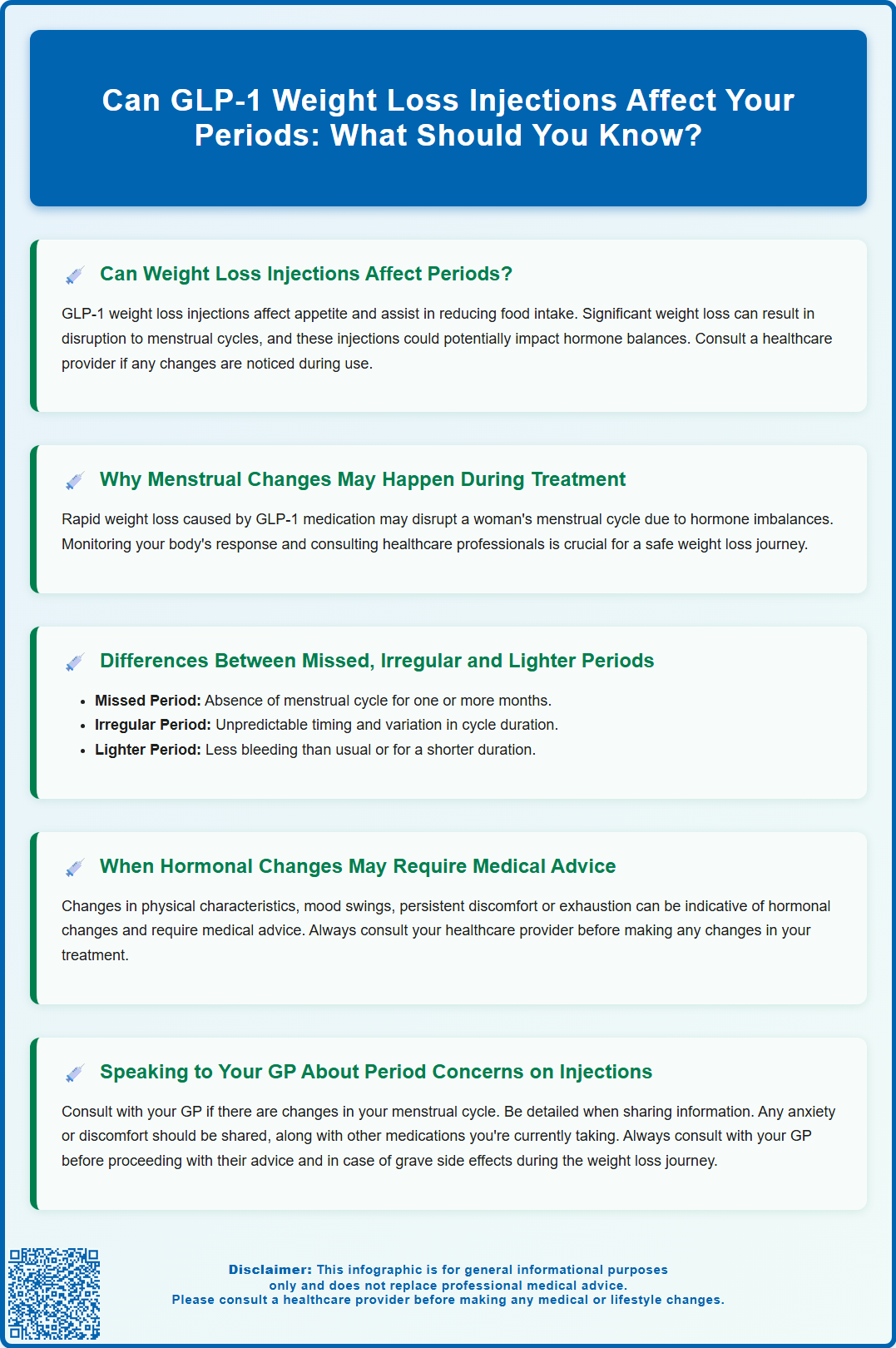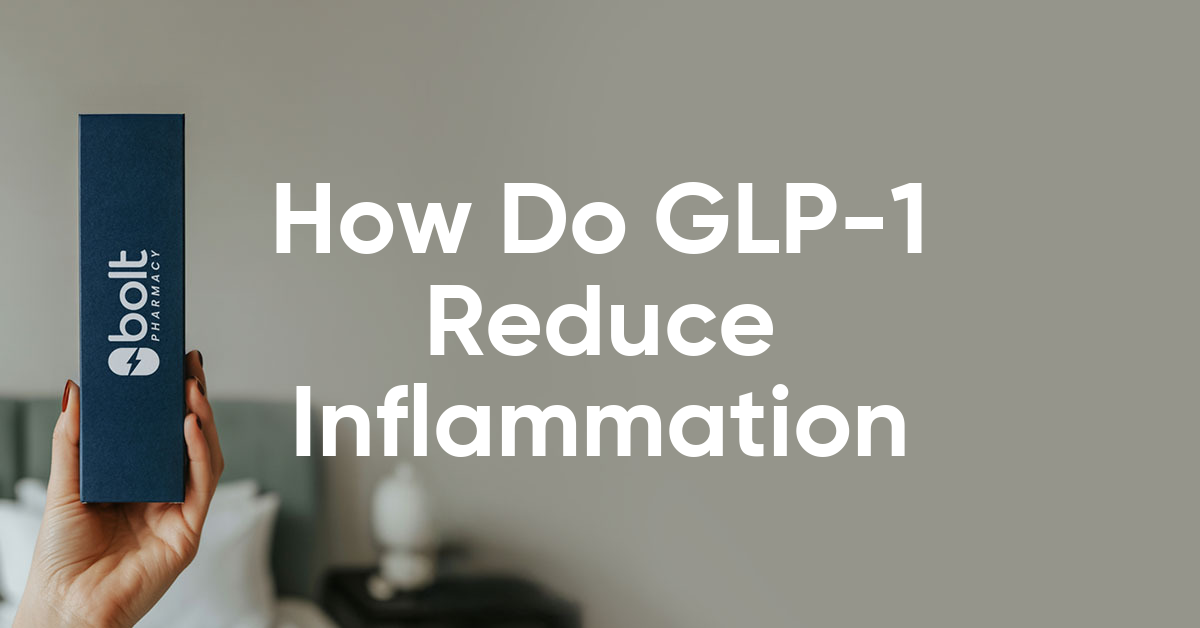Can weight loss injections affect periods? Many women using GLP-1 receptor agonists like semaglutide (Wegovy) or liraglutide (Saxenda) notice changes to their menstrual cycle during treatment. Whilst these medications work primarily by reducing appetite and slowing gastric emptying, the resulting weight loss can disrupt the delicate hormonal balance governing menstruation. Understanding why these changes occur, when they're expected, and which symptoms require medical attention helps women navigate weight management treatment safely. This article examines the relationship between weight loss injections and menstrual health, providing evidence-based guidance for managing period changes during treatment.
Summary: Weight loss injections can indirectly affect periods through the hormonal changes caused by rapid weight reduction, rather than through direct medication effects on reproductive tissues.
- GLP-1 receptor agonists (semaglutide, liraglutide, tirzepatide) work by reducing appetite, increasing satiety, and slowing gastric emptying to achieve weight loss.
- Rapid weight loss decreases leptin levels, which can suppress hypothalamic GnRH secretion and disrupt the menstrual cycle, causing irregular periods or amenorrhoea.
- Menstrual changes during treatment may include longer or shorter cycles, heavier or lighter bleeding, or missed periods, typically related to the rate and magnitude of weight loss.
- These medications are contraindicated in pregnancy, and women of reproductive age should use reliable contraception, with tirzepatide requiring additional barrier methods for 4 weeks after dose changes.
- Seek medical advice for amenorrhoea lasting three months, heavy bleeding affecting quality of life, intermenstrual or postcoital bleeding, or severe pelvic pain.
Table of Contents
How Weight Loss Injections Work in the Body
Weight loss injections prescribed in the UK typically contain glucagon-like peptide-1 (GLP-1) receptor agonists, such as semaglutide (Wegovy) or liraglutide (Saxenda), or dual GIP/GLP-1 receptor agonists like tirzepatide (Mounjaro). These medications were originally developed for type 2 diabetes management but are now licensed for weight management in adults with specific BMI criteria. According to NICE guidance, these treatments are typically recommended for adults with a body mass index of 30 kg/m² or above, or 27 kg/m² with weight-related health conditions, when used as part of specialist weight management services.
GLP-1 receptor agonists work by mimicking a naturally occurring hormone produced in the intestines after eating. When administered via subcutaneous injection, these medications bind to GLP-1 receptors in multiple tissues throughout the body, including the pancreas, brain, and gastrointestinal tract. This binding triggers several physiological responses that contribute to weight loss. In the pancreas, GLP-1 receptor activation stimulates insulin secretion when blood glucose levels are elevated, whilst simultaneously suppressing glucagon release, thereby improving glycaemic control.
The primary mechanism driving weight reduction occurs in the hypothalamus, where these medications enhance satiety signals and reduce appetite. Patients typically report feeling fuller for longer periods and experiencing reduced food cravings. Additionally, GLP-1 receptor agonists slow gastric emptying, which prolongs the sensation of fullness after meals. This combination of reduced appetite, increased satiety, and delayed gastric emptying leads to a spontaneous reduction in caloric intake. Clinical trials have demonstrated varying degrees of weight loss depending on the specific agent: liraglutide typically achieves 5-8% weight loss over 56 weeks (SCALE trials), while semaglutide has shown approximately 15% weight loss over 68 weeks (STEP trials). These medications are contraindicated during pregnancy and breastfeeding, as noted in their respective Summary of Product Characteristics.
Why Rapid Weight Loss May Disrupt Periods
Menstrual cycle disruption is a recognised consequence of significant weight loss, regardless of the method used to achieve it. The relationship between body weight and reproductive function is mediated through complex hormonal pathways involving the hypothalamic-pituitary-ovarian axis. Adipose tissue plays a crucial role in hormone production and metabolism, particularly in the synthesis and storage of oestrogen. When substantial weight loss occurs, the resulting changes in body composition can significantly impact reproductive hormone levels and menstrual regularity.
Rapid weight reduction affects the hypothalamus, which regulates both appetite and reproductive hormone secretion. The hypothalamus monitors energy availability through various signals, including leptin, a hormone produced by fat cells. As body fat decreases during weight loss, leptin levels decline, signalling to the hypothalamus that energy stores are insufficient. In response, the hypothalamus may reduce the pulsatile secretion of gonadotropin-releasing hormone (GnRH), which subsequently decreases luteinising hormone (LH) and follicle-stimulating hormone (FSH) production from the pituitary gland. This cascade can result in anovulation, irregular cycles, lighter periods, or temporary amenorrhoea (functional hypothalamic amenorrhoea).
Women using weight loss injections may experience menstrual changes including longer or shorter cycles, heavier or lighter bleeding, or missed periods entirely. These changes are generally attributed to the rate and magnitude of weight loss rather than a direct effect of the medication on reproductive tissues. Current evidence linking GLP-1 receptor agonists directly to menstrual disorders is limited, with product information not listing menstrual irregularities as common side effects. It is important to note that any missed period in women of reproductive age should prompt a pregnancy test before attributing changes to weight loss or medication. For women with polycystic ovary syndrome (PCOS) who are overweight, weight loss often improves menstrual regularity and ovulation, as reducing insulin resistance can restore normal hormonal balance. The impact on periods therefore varies considerably depending on individual circumstances and underlying reproductive health.

Managing Period Changes While Using Weight Loss Injections
If you experience menstrual changes whilst using weight loss injections, several practical strategies can help manage these alterations whilst continuing your treatment safely. Firstly, maintaining a menstrual diary is invaluable for tracking cycle length, flow characteristics, and associated symptoms. This record provides objective information for healthcare discussions and helps identify patterns that may require medical attention. Note the dates of bleeding, duration, heaviness (number of sanitary products used), and any accompanying symptoms such as pain or mood changes.
Nutritional adequacy becomes particularly important during weight loss. Whilst reducing overall caloric intake, ensure your diet contains sufficient protein, healthy fats, and micronutrients essential for reproductive health. Iron-rich foods are especially important if periods become heavier, as iron deficiency can develop with increased menstrual blood loss. Include sources such as lean red meat, pulses, dark green leafy vegetables, and fortified cereals. If you're concerned about nutritional adequacy during weight loss, discuss with your GP or a registered dietitian whether monitoring iron levels (including ferritin) or supplementation might be appropriate, particularly if dietary intake is significantly restricted.
The pace of weight loss may influence menstrual disruption. If you experience concerning period changes, discuss with your prescribing clinician whether adjusting the medication dose might be appropriate. Never change your dose without clinical supervision, as these medications require specific titration schedules. NICE guidance emphasises individualised treatment approaches that balance efficacy with tolerability. Some women find that menstrual patterns stabilise once weight loss plateaus or slows, as the body adapts to the new metabolic state.
For women using hormonal contraception, be aware that weight loss medications may affect contraceptive efficacy differently. According to the Faculty of Sexual and Reproductive Healthcare, tirzepatide can reduce exposure to oral contraceptives, and additional barrier methods or alternative contraception are recommended for 4 weeks after initiation and each dose increase. For semaglutide and liraglutide, no clinically relevant effect on oral contraceptives has been identified in product information. However, if you experience vomiting or severe diarrhoea with any of these medications, follow the NHS missed pill guidance for oral contraceptives. Long-acting reversible contraceptives (LARCs) such as the implant or intrauterine system are unaffected by gastrointestinal symptoms and may provide more reliable contraception during weight loss treatment.
When to Seek Medical Advice About Period Changes
Whilst some menstrual variation during weight loss is common, certain changes warrant prompt medical evaluation. Contact your GP or prescribing clinician if you experience complete absence of periods (amenorrhoea) for three consecutive months or longer, particularly if you are under 45 years of age and this represents a change from your usual pattern. Prolonged amenorrhoea may indicate significant hypothalamic suppression or other underlying conditions requiring investigation. Your doctor should recommend a pregnancy test and may arrange blood tests to assess hormone levels, including LH, FSH, oestradiol, prolactin, and thyroid function.
Seek medical advice if you develop heavy menstrual bleeding that impacts your quality of life, as defined in NICE guideline NG88. This may include soaking through sanitary protection hourly, passing clots larger than a 50-pence piece, or bleeding lasting longer than seven days. Heavy bleeding can lead to iron deficiency anaemia, causing fatigue, breathlessness, and palpitations. Your GP may perform a full blood count and check ferritin levels to assess iron stores, and may refer you for gynaecological assessment, which could include pelvic ultrasound scanning to exclude structural causes such as fibroids or endometrial pathology.
Intermenstrual bleeding (bleeding between periods) or postcoital bleeding (bleeding after sexual intercourse) should always be evaluated, as these symptoms require exclusion of cervical or endometrial pathology. According to NICE guideline NG12, postmenopausal bleeding requires an urgent two-week referral to exclude gynaecological cancer. Similarly, if you develop severe pelvic pain, particularly if associated with abnormal bleeding, fever, or vaginal discharge, seek same-day medical assessment to exclude pelvic infection or other acute gynaecological conditions.
If you are trying to conceive, discuss menstrual changes with your GP promptly, as irregular ovulation will affect fertility. Weight loss injections are contraindicated in pregnancy, and manufacturers recommend specific discontinuation timeframes before attempting conception: approximately two months for semaglutide, one month for tirzepatide, and a shorter period for liraglutide, as detailed in their respective Summary of Product Characteristics. Women of reproductive age should use reliable contraception whilst taking these medications. Finally, if menstrual changes are accompanied by other concerning symptoms such as significant mood disturbance, hot flushes suggesting premature ovarian insufficiency, or signs of androgen excess including excessive hair growth or acne, arrange a comprehensive hormonal assessment with your GP, who may refer you to an endocrinologist or gynaecologist for specialist evaluation and management.
Frequently Asked Questions
Do weight loss injections directly cause period changes?
Weight loss injections do not directly affect menstrual cycles; rather, the hormonal changes resulting from rapid weight reduction disrupt the hypothalamic-pituitary-ovarian axis, leading to irregular periods or amenorrhoea.
Should I stop my weight loss injection if my periods become irregular?
Do not stop your medication without consulting your prescribing clinician. Discuss menstrual changes with your GP, who may adjust your dose or investigate other causes whilst continuing safe treatment.
Can I get pregnant whilst using weight loss injections?
These medications are contraindicated in pregnancy and require discontinuation before conception (approximately two months for semaglutide). Women of reproductive age must use reliable contraception during treatment, with tirzepatide requiring additional barrier methods after dose changes.
The health-related content published on this site is based on credible scientific sources and is periodically reviewed to ensure accuracy and relevance. Although we aim to reflect the most current medical knowledge, the material is meant for general education and awareness only.
The information on this site is not a substitute for professional medical advice. For any health concerns, please speak with a qualified medical professional. By using this information, you acknowledge responsibility for any decisions made and understand we are not liable for any consequences that may result.
Heading 1
Heading 2
Heading 3
Heading 4
Heading 5
Heading 6
Lorem ipsum dolor sit amet, consectetur adipiscing elit, sed do eiusmod tempor incididunt ut labore et dolore magna aliqua. Ut enim ad minim veniam, quis nostrud exercitation ullamco laboris nisi ut aliquip ex ea commodo consequat. Duis aute irure dolor in reprehenderit in voluptate velit esse cillum dolore eu fugiat nulla pariatur.
Block quote
Ordered list
- Item 1
- Item 2
- Item 3
Unordered list
- Item A
- Item B
- Item C
Bold text
Emphasis
Superscript
Subscript










